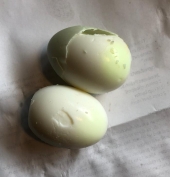How to prevent fly strike in sitting birds
I’m sorry you lost her. Unfortunately, losing animals for various weird reasons is a big part of farm life. There are so many things to learn about each animal and even specific breeds have their issues. Sitting fowl are very vulnerable and some die doing it or shortly thereafter.
It sounds to me that your goose died from “sitting fly strike”, which occurs when bad eggs start oozing or good eggs break and attract flies, which lay eggs on the egg. Maggots hatch and eat the egg first, if they can get through the shell, then attack the sitting bird. When a bad egg explodes under a sitting bird, the belly of the bird is plastered with sticky, tasty maggot food. There can be many types of flies laying eggs and some maggots eat live flesh, right into the organs.
So what can we do to prevent some deaths?
-If an egg breaks in the nest at any time, for whatever reason, you need to clean all the eggs, the bird and replace nesting material. Wash the bird with Dawn and blow dry. If there are maggots present, wash with shampoo containing permethrin, which is safe for fowl. Check human lice shampoos or dog flea and tick shampoos in your country.
-Write with indelible marker on the eggs you want her to hatch. Other birds may add to the nest, some birds steal and add to their own nest. Any egg that appears three days after she starts sitting, is not going to hatch because she will abandon it 2-3 days after the others start hatching. Remove the newcomers, hatch them yourself or eat them.
-If the bird kicks an egg out of the nest, candle it before putting it back in. Some birds remove dead eggs, some good eggs may get accidentally moved out. Candle to be sure. Dead eggs make great compost.
-Only leave an appropriate clutch. Extra eggs risk breakage and rot, which attracts flies and predators.
-Candle the eggs on day 12 to make sure they are growing. By day twelve you will be able to see veins clearly. If they have a crack or are not growing, compost or feed them to livestock.
-Protect your bird from predators as best you can.
-Place food and water nearby to encourage intake. Some birds sit and stay, some take breaks. Make it easy for them to care for themselves during this draining process.
Happy hatching!









